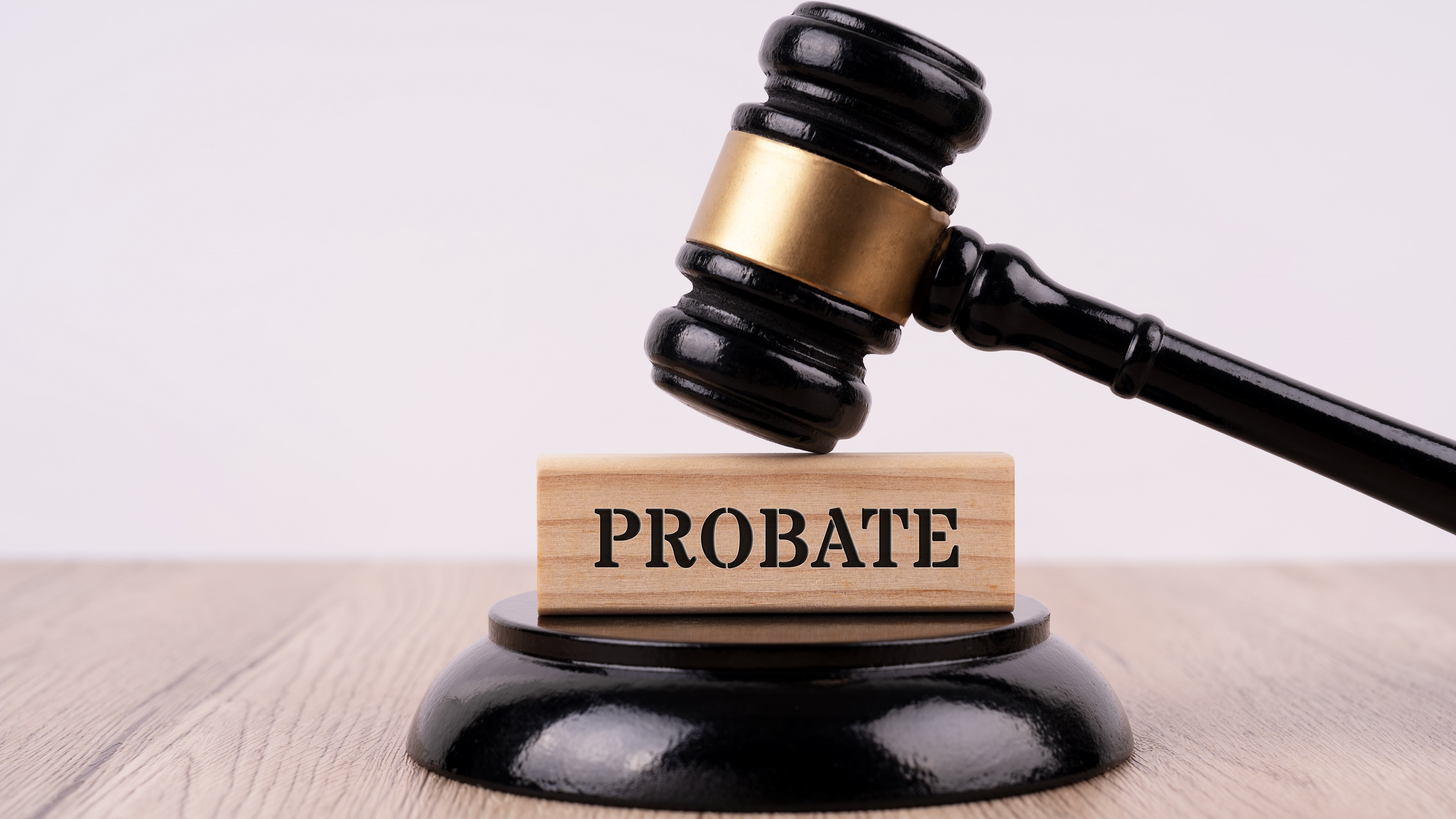What Is Probate, and Who Has to Deal With It?
The probate process can be a long and expensive journey for heirs. Real estate, cars and even art often trigger probate, but other assets get a free pass.


Profit and prosper with the best of Kiplinger's advice on investing, taxes, retirement, personal finance and much more. Delivered daily. Enter your email in the box and click Sign Me Up.
You are now subscribed
Your newsletter sign-up was successful
Want to add more newsletters?

Delivered daily
Kiplinger Today
Profit and prosper with the best of Kiplinger's advice on investing, taxes, retirement, personal finance and much more delivered daily. Smart money moves start here.

Sent five days a week
Kiplinger A Step Ahead
Get practical help to make better financial decisions in your everyday life, from spending to savings on top deals.

Delivered daily
Kiplinger Closing Bell
Get today's biggest financial and investing headlines delivered to your inbox every day the U.S. stock market is open.

Sent twice a week
Kiplinger Adviser Intel
Financial pros across the country share best practices and fresh tactics to preserve and grow your wealth.

Delivered weekly
Kiplinger Tax Tips
Trim your federal and state tax bills with practical tax-planning and tax-cutting strategies.

Sent twice a week
Kiplinger Retirement Tips
Your twice-a-week guide to planning and enjoying a financially secure and richly rewarding retirement

Sent bimonthly.
Kiplinger Adviser Angle
Insights for advisers, wealth managers and other financial professionals.

Sent twice a week
Kiplinger Investing Weekly
Your twice-a-week roundup of promising stocks, funds, companies and industries you should consider, ones you should avoid, and why.

Sent weekly for six weeks
Kiplinger Invest for Retirement
Your step-by-step six-part series on how to invest for retirement, from devising a successful strategy to exactly which investments to choose.
Managing and securing your estate is one of the most important steps in personal finance. An estate plan ensures your assets get distributed according to your wishes. In addition to mitigating confusion and hardship for your loved ones, it also limits the court’s control over your assets in probate.
What is probate?
Probate is the legal process for reviewing, managing and distributing someone’s estate after they die. The purpose of probate is to verify the validity of your estate plan. It includes reviewing the legitimacy of wills, handling any outstanding debts and taxes, appraising property values and dividing assets among heirs.
The probate process is in place to protect your estate, working to prevent fraud after your death. But this legal proceeding doesn’t look the same for everyone. Some assets are required to go through probate — especially if you die without a will or fail to name beneficiaries for some of your accounts.
From just $107.88 $24.99 for Kiplinger Personal Finance
Become a smarter, better informed investor. Subscribe from just $107.88 $24.99, plus get up to 4 Special Issues

Sign up for Kiplinger’s Free Newsletters
Profit and prosper with the best of expert advice on investing, taxes, retirement, personal finance and more - straight to your e-mail.
Profit and prosper with the best of expert advice - straight to your e-mail.
Assets subject to probate
Real estate properties with a single owner who is deceased will most likely have to go through probate. This includes properties such as single-family homes and condominiums. If the deceased homeowner has a will, the court will distribute the home according to the instructions left in the will. The property will be distributed according to state laws if the owner doesn't have a will.
Vehicles such as cars, motorcycles and boats will probably have to go through the probate process, too. If there’s a will, the vehicle will be distributed accordingly, but the process gets more complicated if there isn’t. Specific rules and regulations vary depending on the state you live in.
Personal belongings like art and jewelry must go through probate. If these items are of high value, they’ll also need to be appraised.
Bank accounts, life insurance policies, stocks and bonds owned solely by the deceased person must all go through probate if a beneficiary is not named.
Probate can be long and costly
Settling an estate through probate is no quick process. The size of the estate, the value of certain assets, and state-specific probate laws can all impact the length of time it will take to finalize the estate. The situation can become even more complicated and drawn out if there are questions or concerns about the validity of a will, or if the family cannot agree on the division of assets.
The amount of time it takes to settle the estate will also affect how much you’ll pay to go through the probate process. You’ll be required to pay certain expenses, including outstanding debts, court and filing fees and lawyer costs. You may also be required to pay a state inheritance tax, if you live in one of the six states that impose them on some recipients.
Probate laws vary
Where you live, the size of your estate and the value of your assets all impact the probate process. In some states, estates that don’t meet a certain monetary value may be able to bypass these proceedings entirely. Similarly, certain assets in the estate aren’t subject to probate so long as they have beneficiaries designated. These assets range from pension plans, life insurance plans, medical savings accounts and IRAs. Additionally, due to survivorship rights, assets jointly owned typically aren’t required to go through probate.
Some other strategies for getting around probate include utilizing a trust or distributing assets to heirs via affidavit.
Probate can be a lot to handle, especially following the death of a loved one. But if you’re proactive with your estate planning, the probate process should be a last resort for surviving family members. Creating a concise, detailed will and naming beneficiaries to any accounts can help your loved ones avoid these proceedings, potentially saving them time and money, while mitigating any feuds or disagreements.
Pat Simasko is an investment advisory representative of and provides advisory services through CoreCap Advisors, LLC. Simasko Law is a separate entity and not affiliated with CoreCap Advisors. The information provided here is not tax, investment or financial advice. You should consult with a licensed professional for advice concerning your specific situation.
Related Content
- Leaving Property to Multiple Heirs? What to Consider
- Naming Beneficiaries for Inherited IRAs: What You Need to Know
- The Basics of Estate Planning
- What Assets Should You Put (or Not Put) in Your Trust?
- How Quitclaim Deeds Can Cause Estate Planning Catastrophes
Profit and prosper with the best of Kiplinger's advice on investing, taxes, retirement, personal finance and much more. Delivered daily. Enter your email in the box and click Sign Me Up.

Patrick M. Simasko is an elder law attorney and financial adviser at Simasko Law and Simasko Financial, specializing in elder law and wealth preservation. He’s also an Elder Law Professor at Michigan State University School of Law. His self-effacing character, style and ability have garnered him prominence and recognition throughout the metro Detroit area as well as the entire state.
-
 Stocks Sink With Alphabet, Bitcoin: Stock Market Today
Stocks Sink With Alphabet, Bitcoin: Stock Market TodayA dismal round of jobs data did little to lift sentiment on Thursday.
-
 Betting on Super Bowl 2026? New IRS Tax Changes Could Cost You
Betting on Super Bowl 2026? New IRS Tax Changes Could Cost YouTaxable Income When Super Bowl LX hype fades, some fans may be surprised to learn that sports betting tax rules have shifted.
-
 How Much It Costs to Host a Super Bowl Party in 2026
How Much It Costs to Host a Super Bowl Party in 2026Hosting a Super Bowl party in 2026 could cost you. Here's a breakdown of food, drink and entertainment costs — plus ways to save.
-
 The 4 Estate Planning Documents Every High-Net-Worth Family Needs (Not Just a Will)
The 4 Estate Planning Documents Every High-Net-Worth Family Needs (Not Just a Will)The key to successful estate planning for HNW families isn't just drafting these four documents, but ensuring they're current and immediately accessible.
-
 Love and Legacy: What Couples Rarely Talk About (But Should)
Love and Legacy: What Couples Rarely Talk About (But Should)Couples who talk openly about finances, including estate planning, are more likely to head into retirement joyfully. How can you get the conversation going?
-
 How to Get the Fair Value for Your Shares When You Are in the Minority Vote on a Sale of Substantially All Corporate Assets
How to Get the Fair Value for Your Shares When You Are in the Minority Vote on a Sale of Substantially All Corporate AssetsWhen a sale of substantially all corporate assets is approved by majority vote, shareholders on the losing side of the vote should understand their rights.
-
 How to Add a Pet Trust to Your Estate Plan: Don't Leave Your Best Friend to Chance
How to Add a Pet Trust to Your Estate Plan: Don't Leave Your Best Friend to ChanceAdding a pet trust to your estate plan can ensure your pets are properly looked after when you're no longer able to care for them. This is how to go about it.
-
 Want to Avoid Leaving Chaos in Your Wake? Don't Leave Behind an Outdated Estate Plan
Want to Avoid Leaving Chaos in Your Wake? Don't Leave Behind an Outdated Estate PlanAn outdated or incomplete estate plan could cause confusion for those handling your affairs at a difficult time. This guide highlights what to update and when.
-
 I'm a Financial Adviser: This Is Why I Became an Advocate for Fee-Only Financial Advice
I'm a Financial Adviser: This Is Why I Became an Advocate for Fee-Only Financial AdviceCan financial advisers who earn commissions on product sales give clients the best advice? For one professional, changing track was the clear choice.
-
 I Met With 100-Plus Advisers to Develop This Road Map for Adopting AI
I Met With 100-Plus Advisers to Develop This Road Map for Adopting AIFor financial advisers eager to embrace AI but unsure where to start, this road map will help you integrate the right tools and safeguards into your work.
-
 The Referral Revolution: How to Grow Your Business With Trust
The Referral Revolution: How to Grow Your Business With TrustYou can attract ideal clients by focusing on value and leveraging your current relationships to create a referral-based practice.